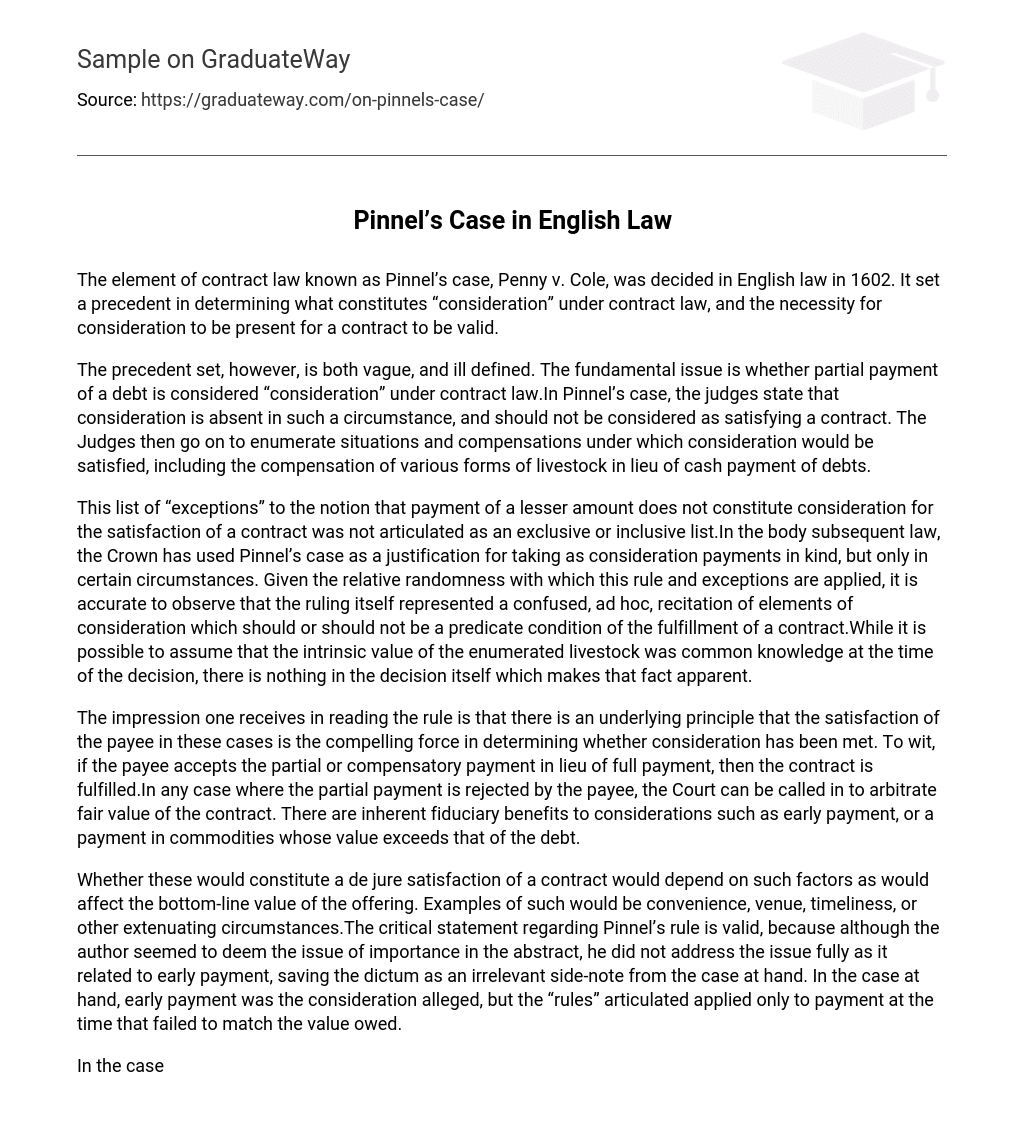The element of contract law known as Pinnel’s case, Penny v. Cole, was decided in English law in 1602. It set a precedent in determining what constitutes “consideration” under contract law, and the necessity for consideration to be present for a contract to be valid.
The precedent set, however, is both vague, and ill defined. The fundamental issue is whether partial payment of a debt is considered “consideration” under contract law.In Pinnel’s case, the judges state that consideration is absent in such a circumstance, and should not be considered as satisfying a contract. The Judges then go on to enumerate situations and compensations under which consideration would be satisfied, including the compensation of various forms of livestock in lieu of cash payment of debts.
This list of “exceptions” to the notion that payment of a lesser amount does not constitute consideration for the satisfaction of a contract was not articulated as an exclusive or inclusive list.In the body subsequent law, the Crown has used Pinnel’s case as a justification for taking as consideration payments in kind, but only in certain circumstances. Given the relative randomness with which this rule and exceptions are applied, it is accurate to observe that the ruling itself represented a confused, ad hoc, recitation of elements of consideration which should or should not be a predicate condition of the fulfillment of a contract.While it is possible to assume that the intrinsic value of the enumerated livestock was common knowledge at the time of the decision, there is nothing in the decision itself which makes that fact apparent.
The impression one receives in reading the rule is that there is an underlying principle that the satisfaction of the payee in these cases is the compelling force in determining whether consideration has been met. To wit, if the payee accepts the partial or compensatory payment in lieu of full payment, then the contract is fulfilled.In any case where the partial payment is rejected by the payee, the Court can be called in to arbitrate fair value of the contract. There are inherent fiduciary benefits to considerations such as early payment, or a payment in commodities whose value exceeds that of the debt.
Whether these would constitute a de jure satisfaction of a contract would depend on such factors as would affect the bottom-line value of the offering. Examples of such would be convenience, venue, timeliness, or other extenuating circumstances.The critical statement regarding Pinnel’s rule is valid, because although the author seemed to deem the issue of importance in the abstract, he did not address the issue fully as it related to early payment, saving the dictum as an irrelevant side-note from the case at hand. In the case at hand, early payment was the consideration alleged, but the “rules” articulated applied only to payment at the time that failed to match the value owed.
In the case at hand, the earliness of the payment might have been consideration in itself, as early payment has intrinsic values of convenience and use of capital.That the judges chose to utilize an off-point case to posit a rule of law makes it all the more likely that that articulation of the rule would be a confusing, haphazard attempt to codify a myriad of theoretical situations using a small set of examples which not only do not reflect the totality of the intention of the Court, but are also a confusing digression from the central thesis if modes of consideration. While it would have been difficult to set a definitive list of consideration rules and standards, the court erred in the halfhearted attempt to partially define what qualifies as consideration.The case in point was decided on a technicality, and was chosen as a mode to articulate common law opinion on the matter of consideration.
As such, it was incumbent upon the judges to draw examples out of the air to illustrate their underlying argument. That these examples have been formalized to a point where they represent common law on the subject of consideration is troubling, as it is clear that the list was not meant to be comprehensive.Subsequent cases have gone further to define the limits of consideration, but a cohesive list of what is, and is not consideration has yet to materialize in the literature. On the subject of consideration as a requisite element to the validity of an executed contract, that issue does not seem to be addressed at all in Pinnel’s Rule.
Rather, it is assumed that the validity of the contract is contingent on the satisfactory execution of its terms. Such a determination is consistent with both common law and common sense.As it is applied today, Pinnel’s rule speaks more to the use of interest on principle owed as consideration for deferred payment than satisfaction through the offer of non-enumerated goods or services. The organic development of this application of the principle of Pinel’s rule in contract law vindicates the original ruling as “in the proper spirit”.
However, it is clear that attempting to read Pinnel’s Case one would be more likely to come away with a sense of confusion regarding the subject of consideration, rather than a meaningful application in contract law.





